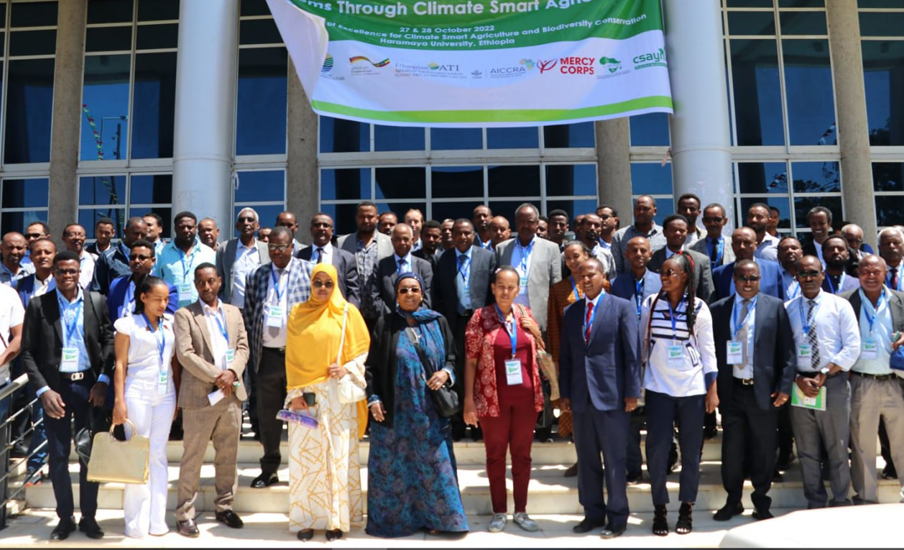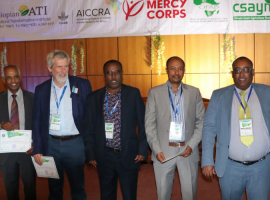An international Conference on Transforming Food Systems through Climate Smart Agriculture was held at Africa Center of Excellence for Climate Smart Agriculture and Biodiversity Conservation (ACE Climate SABC), Haramaya University on 27th and 28th of October 2022. The Conference was organized with partnership and support from various governmental and non-governmental organizations such as Ministry of Agriculture, Gesellschaft für Internationale Zusammenarbeit (GIZ), Agricultural Transformation Institute (ATI), Accelerating Impacts of CGIAR Climate Research for Africa (AICCRA), MERCY CORPS, Open Forum on Agricultural Biotechnology in Africa (OFAB) and Climate Smart Agriculture Youth Networks (csayn). More than 100 scholars and researchers including the presenters have participated on the Conference.
The Vice President for Academic Affairs and Center leader, Professor Mengistu Urge has opened the Conference with his welcoming and opening remarks touching the main points about the inevitability of the Conference at this time. According to the Professor, this Conference could be considered as one of the historic events since it is happening at the time the World is facing severe food and nutrition scarcity, climate change and global warming related problems which have been escalating for the last three decades. In addition, it is taking place when the world is talking about the need for protecting the current food systems from further disintegration and inefficiency of transforming food systems integrated with climate smart agriculture to respond to the future demand for food. Stressing on the current situation that the world is facing, Professor Mengistu noted that this conference could be considered as part of the ways we make sympathetic for concerned bodies, through making Climate Smart Agriculture and food systems issue of researchers and farmers alike.
The opening address was followed by keynote speeches made by speakers from diverse field of specializations who have presented their keynotes on different areas in relation to food systems and climate smart agriculture. Dr. Mandefro Nigussie, Chief executive officer of Agricultural Transformation Institute (ATI); Dr. Kindie Tesfaye, Senior Scientist at the international Maize and Wheat Improvement Center (CIMMY); Dr. Gemedo Dalle, Associate Professor of Vegetation Ecology and Biodiversity Management for Environmental Science at Addis Ababa University; Dr. Kibebew Kibret, Associate Professor of Soil Sciences College of Agriculture and Environmental Sciences at Haramaya University; Professor John Morton, professor of development anthropology at the Natural Resources Institute, University of Greenwich,; Professor Brook Lemma, Professor of Freshwater and Fisheries at Addis Ababa University, and Dr. Tadesse Daba Senior Researcher and Director for Agricultural Biotechnology Research have transpired the research community participated on the Conference with transcending and thought provoking keynote speeches.
Professor Nigussie Dechassa, who has taken the role of summarizing the keynote speeches and presentations has noted that there were a total of 75 papers submitted for the conference out of which 54 are selected for presentation by the reviewing committee and categorized under 8 themes such as: Climate Smart Agricultural Technologies and practice, Climate Informed Services for Agriculture and Food Systems, Climate Risk Management in Agriculture and Resilient Economy, Agroecologist for Sustainable Food System, Biotechnology for Climate Resilient Agriculture, Biodiversity and Nature based Solutions for Climate Risk Management, Food systems and Markets in the changing climate and Gender and institutions for sustainable food systems.
Accordingly, 27 papers were presented orally and 27 Poster were displayed. Professor Nigussie recalled that presentations and discussions went well; they are all new insights to climate change induced risks and mitigation measures to be taken in the future. Additionally, the professor says, discussions following the keynote speeches have enabled the participants of the conference to retort over the points, questions, and comments in the ensuing discussions, and it was emphasized that climate change is seriously curtailing the productivity of African Agriculture; imposing problem on food and nutrition insecurity and obstructing the efforts being made to address the challenges. He also noted that more than 80% of the food comes from smallholder farmers who are seriously affected by the climate change related hazards, and all the papers presented have played music of food systems and climate smart agriculture, and this makes the conference relevant to the recurrent problem that the world is facing, pointing out that all the stakeholders need to walk their talks to bring about solutions to the problem of food insecurity in the future.
Reactions from participants and fellow researchers to the summary indicated that there is a limitations of participation from a policymakers’ in these kinds of conferences and the research community need to find ways to address the issues to them; insufficiency of research addressing the three pillars of climate smart agriculture (productivity, resilience and mitigations); lack of focus on the issues of drylands, population pressure and family planning should have been emphasized as factors, solutions, and home take messages
Finally, Professor Jeylan Wolyie, a Vice President for Administrative and Student Affairs has closed the conference. In his closing remark, Professor Jeylan emphasized that in 21st century, a climate smart blind person cannot survive as climate has a commanding power over everyone of us. He further noted that Ethiopia is one of countries in the Horn of Africa that is continuously and severely affected by drought and food insecurity. He also pointed out that the climate smart and food systems research need to also focus on the dimensions of human insecurity, political instabilities and conflicts instigated by drought and food shortages in Africa. He also appreciated the organizers of the conference and called for the stakeholders to partner with Africa Center of Excellence for Climate Smart Agriculture and Biodiversity Conservation (ACE Climate SABC), for the Center to sustainably continue working for such stimulating academic and research excellence. The University leaders have finally awarded the Certificates of appreciation to the partners, Keynote speakers and paper/poster presenters.

